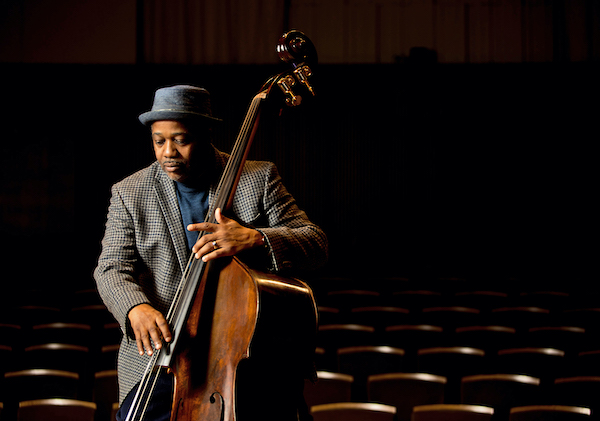Jan 13, 2026 2:09 PM
More Trump-Kennedy Center Cancellations
The fallout from the renaming of the John F. Kennedy Center for the Performing Arts to include President Donald…

On his latest album, Rodney Whitaker pays tribute to Duke Ellington.
(Photo: Jessica D. Cowles)For bassist Rodney Whitaker, making an album is a serious endeavor. “Recordings are diaries of where you are in your life,” Whitaker told DownBeat. “But they’re also about doing research. And doing research, then being able to communicate and talk about it, that’s a beautiful thing for me.”
That was basically the plan when Whitaker recorded All Too Soon: The Music Of Duke Ellington (Origin), a project preceded by no less than 20 years of reflection. The seed was planted during his long stretch on bass with what then was called the Lincoln Center Jazz Orchestra. The big band performed Ellington’s repertoire, and Whitaker had access to two tremendous sources of insight: music director Wynton Marsalis and baritone saxophonist Joe Temperley (1929–2016).
“Joe was instrumental in getting me to think about Ellington’s music,” Whitaker said. “Joe had a chance to play with Duke a little bit; he replaced Harry Carney in the band when Harry got sick, just before Duke died. But he came to really understand how to phrase. I would ask Joe tons of questions about Ellington’s music from that perspective. With Wynton, it was more philosophical and historical, like, ‘What was Duke trying to say here?’ So, I had both of these mindsets as I approached the project.”
That—plus his long run teaching jazz double-bass and directing jazz studies at Michigan State University—informed Whitaker’s decision to go beyond the tunes and honor Ellington’s commitment to finding the best players and encouraging them to express themselves. “My idea was to make it more like a cutting session, like just picking up ‘Sweets’ Edison, Ben Webster and those guys,” he explained. “So, we talked about the melodies being a certain kind of way. And I did want the heads to be played correctly, because the theme is the most important thing that locks the nonmusician to the music. But not at any point did I [direct] how someone should improvise.”
Whitaker and the band did come up with arrangement ideas, though. While building on the Ella Fitzgerald treatment for “Caravan,” Whitaker had the idea of adding the bass line from Dizzy Gillespie’s “Tin Tin Deo.” And on “Perdido,” rather than let each soloist take a complete chorus or two, everyone took just four bars in sequence, in effect creating one big line collectively, before tying it into a long unison passage. “That’s a line that Clark Terry originally wrote for Duke,” Whitaker explained. “Then Gerald Wilson did the arrangement. We were joking around in the studio when someone said, ‘Do y’all know this line?’ Everyone did, so I said, ‘Let’s put it in the tune.’”
This spontaneity proved contagious. “I wasn’t thinking at all about taking things too far out,” said Karriem Riggins, who plays drums on all but two of the album’s 12 tracks. “I listen to a lot of that music, as well as trying to create a new sound. So, I feel like all the tradition is in me. Putting that all together in the soup is the way to make it hip.”
That energy, in turn, fed back to Whitaker. “That’s the power of having young cats in the band,” he said. “Young musicians play so much better than we did when I was young. They’ve been exposed to more information and heard more recordings. Somebody said to me once that the guys who grew up in the ’50s and ’60s played with more humanity. But that was just how guys grew up then, with a different view of life. We didn’t have computers and iPhones. Young people today spend more time with themselves than we did. You just have to accept that things change.
“It’s not like 1956,” Whitaker said, pausing and laughing knowingly. “Although sometimes it feels like it is. But that is a whole ’nother story.” DB

Belá Fleck during an interview with Fredrika Whitfield on CNN.
Jan 13, 2026 2:09 PM
The fallout from the renaming of the John F. Kennedy Center for the Performing Arts to include President Donald…

Peplowski first came to prominence in legacy swing bands, including the final iteration of the Benny Goodman Orchestra, before beginning a solo career in the late 1980s.
Feb 3, 2026 12:10 AM
Ken Peplowski, a clarinetist and tenor saxophonist who straddled the worlds of traditional and modern jazz, died Feb. 2…

The success of Oregon’s first album, 1971’s Music Of Another Present Era, allowed Towner to establish a solo career.
Jan 19, 2026 5:02 PM
Ralph Towner, a guitarist and composer who blended multiple genres, including jazz — and throughout them all remained…

Rico’s Anti-Microbial Instrument Swab
Jan 19, 2026 2:48 PM
With this year’s NAMM Show right around the corner, we can look forward to plenty of new and innovative instruments…

Richie Beirach was particularly renowned for his approach to chromatic harmony, which he used to improvise reharmonizations of originals and standards.
Jan 27, 2026 11:19 AM
Richie Beirach, a pianist and composer who channeled a knowledge of modern classical music into his jazz practice,…